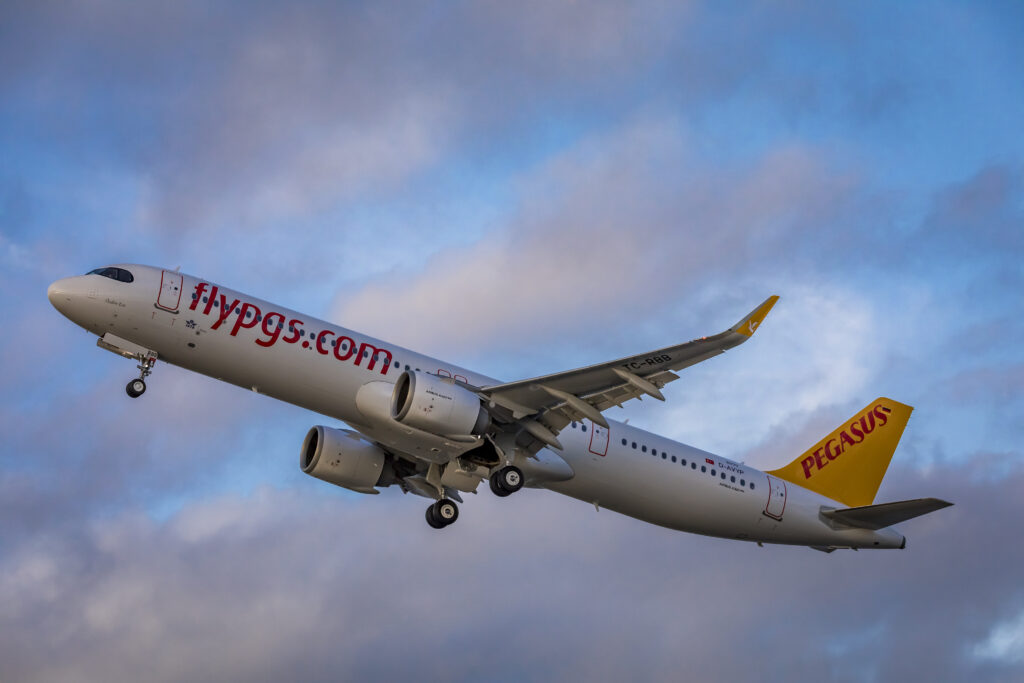Pegasus Airlines’ outlook for next year is a positive one, as it eyes fleet growth and customer service improvement plans for 2024.
Speaking exclusively to LARA, Pegasus Airlines’ CCO, Onur Dedeköylü, said that the drop in so-called ‘revenge’ travel had led to “more healthy, sustainable travel” for the airline, with “a solid base plan to support our growth with fuel-efficient aircraft.”
In October, Pegasus Airlines added an additional A321neo to its fleet, rounding out its total to 100 aircraft. Named Cumhuriyet (‘Republic’) in honour of the 100th anniversary of the Republic of Turkey, this is the ninth of 16 new aircraft scheduled to join Pegasus Airlines’ fleet in 2023. This was the 75th aircraft to be delivered as part of its 2012 Airbus order.
The airline is expecting to receive a further 16 A321neo aircraft in 2024.
Further opportunities for leasing were not ruled out by the CCO, if more capacity was needed, but for now, he remained confident that the airline would stick to its original plan of receiving deliveries of new aircraft and operating them.
Noting rising fuel costs in particular, Dedeköylü said: “My focus, as CCO, will be how cost-efficient we are in this inflationary environment so we can increase the load factor side [whilst maintaining] affordable prices,” he confirmed.
He disclosed that Pegasus Airlines is 50% hedged for fuel in 2023, going into 2024.
Runway and terminal growth
2024 will look to be stable for the airline in terms of demand.
The plans for its continued growth will be supported by the opening of its second runway at its Sabiha Gökçen airport hub in Istanbul, the CCO added, anticipated to happen in mid-November.
However, whilst there are plans for another terminal, until terminal restrictions are lifted at Sabiha Gökçen airport, capacity cannot grow much further. Antalya, thankfully, proves to be “more flexible” for the airline, in terms of capacity growth.
Yet, this still remains a high priority issue. “For international travel to grow, for us and for other Turkish carriers, airport capacity will be very important in the near future, in 2024,” he said.
Improving its airport customer service will serve as another key priority for the airline. It already has self-service baggage kiosks at its hub and at other airports in Turkey, which around 40% of passengers use.
Dedeköylü said the airlines’ next aim is to make this baggage processing available on a more global scale.
“Our aim is to extend that to international airports, and we’re currently in discussions with major airports [to promote and install this feature]” he confirmed.
A boost for AI?
Pegasus Airlines is also making strides to further support its customers with a “clear roadmap” ahead of it for 2024, said Dedeköylü.
“Our key selling point is really our prices” he said. “It’s so important for a low cost airline to actually give the tools for people to do their bookings as flexible as possible.”
Whilst Pegasus already offers a lot in terms of booking flexibility – offering its passengers price freezes, and a range of flexible ticket products – there is also a huge emphasis on search functionality.
In response to this, the airline is working to offer its customers ways to compare prices and improve access to price deals as and when they occur. “We’re now working on a tool to provide clarity about the campaign available to be seen on a calendar,” Dedeköylü confirmed. “It’ll help people make a more optimised decision faster.”
Generative AI is also changing the game in the aviation industry, and something which Pegasus Airlines is keen to promote. Giving its passengers a seamless digital experience is the end goal.
“It’s very early,” he admitted, “but we’re hypothesising ideas. How we can use AI in a more inspirational and conversion targeted manner [for example].”
“It’ll be a matter of strategic planning with the right people.”

